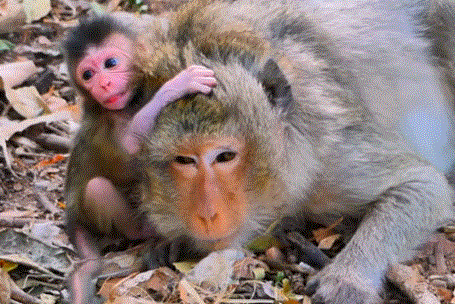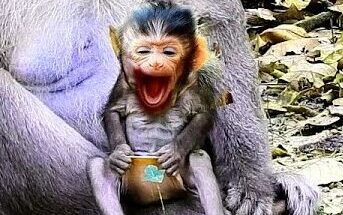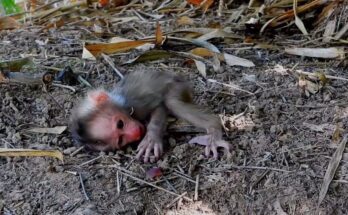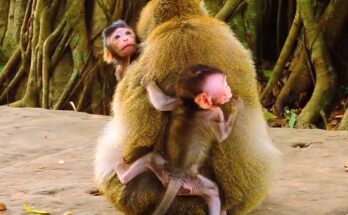Deep in the heart of the Angkor Wat forest, where the ancient stones whisper stories of centuries past, life continues its timeless rhythm. Among the towering trees and the golden sunlight breaking through the leaves, a small miracle unfolds — the quiet, powerful love between a mother monkey and her baby.
The mother, whom the locals affectionately call Lina, is easy to spot. Her fur glows warm under the morning sun, and her movements are calm but filled with purpose. Her baby — a tiny, playful soul barely old enough to balance on his own — clings to her belly with wide, trusting eyes.

Every morning, Lina begins her day by finding food — tender leaves, bits of fruit, and sometimes the sweet gifts left behind by kind travelers. But before she eats, she always shares with her baby first. Carefully, she peels the fruit and holds it close to his mouth, waiting for his small hands to grab it.
He tries, fumbles, and drops it in the dirt. Lina doesn’t scold. Instead, she smiles in her quiet way — eyes soft, movements gentle — and picks it up again. She wipes it clean on her fur and offers it once more. This time, he eats.
Watching them, it’s impossible not to feel the echo of something familiar — the kind of love that needs no words, no reward, just presence. Every motion speaks of patience, every touch a lesson in tenderness.
As the day warms, the little one grows braver. He wiggles free from her arms and toddles toward the edge of a mossy stone, curious about the play of light on the ground. The moment his foot slips, Lina reacts in a flash — one arm reaching out, pulling him back before he falls. She doesn’t panic. She just holds him close, whispering reassurance through touch.
Then, as if nothing had happened, she begins to play.
She tugs gently at his tail, prompting him to chase her through the grass. He squeals with joy, his tiny leaps awkward but full of energy. Lina lets him “win,” sitting down with exaggerated surprise as he pounces on her arm. The baby laughs in that high, sweet way that only young creatures can — unguarded, pure, alive.
For several minutes, the forest feels lighter. Even the birds pause their song as if to watch.
But not all company in the jungle is friendly. A large male monkey — likely part of another group — approaches from the trees. He’s curious, eyes fixed on the baby. Lina notices immediately. She rises, her body suddenly still but strong. The baby senses it too and hides behind her.
Her gaze locks onto the intruder. There’s no aggression, only authority. Her body forms a living wall between danger and her child. The male hesitates, then turns away, perhaps recognizing that there’s no victory to be found here — only the fierce, unbreakable love of a mother.
When the forest quiets again, Lina gently strokes her baby’s head. The tension fades. He clings to her neck, eyes half-closed, feeling safe once more. She settles back under the banyan roots, rocking him as the afternoon sun filters through the branches.
You can almost hear her humming, though no sound comes — just the rhythm of life, the heartbeat of motherhood that transcends language and species.
Later, as the sun sinks low over the ancient temples, painting the world in amber light, Lina cradles her baby and begins her climb back to the treetops. Each step is sure and steady. The baby looks around, watching the glowing world from her arms, his small face pressed against her chest.
Down below, the tourists drift away, unaware that they’ve just witnessed something sacred — not just a moment in nature, but a reminder of what binds all life together: love, protection, and the simple joy of being near someone who would give anything for you.
At the edge of the forest, the wind stirs the leaves like a soft lullaby. Lina settles into a nest of branches, curling her body around her child. His eyes flutter closed. Her hand rests on his back.
And as night covers Angkor in peace, the two of them drift into sleep — safe, warm, and together.


